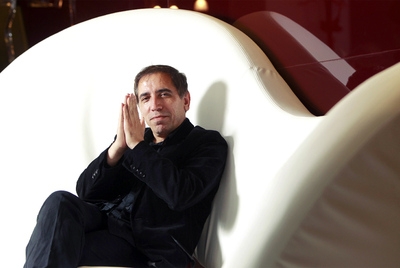

"I'm a director who wants to change the world through my cinema"
Mohsen Makhmalbaf landed in Spain this week imbued with the spirit of the May 15 protest movement. The Iranian director and screenwriter of films such as Gabbeh (1995), A Moment of Innocence (1995) and Kandahar (2001) was here to visit Madrid's La Casa Encendida cultural center and the Espai Cultural de Caja Madrid venue in Barcelona, and chat about cinema and social change in Iran and the "gigantic prison" his country has become. But first he couldn't stop himself from passing by the protestors' camp in the capital's Puerta del Sol square.
"The young people who are in the square must be the eyes of democracy," he said, before personally making enquiries in the camp about the motivations of the movement. The protestors would doubtless be interested to know about Makhmalbaf's own adventures in human rights activism- his involvement in the partisan struggle against his country's former Shah (in whose prisons he spent several years) in the 1970s and the enforced exile from his homeland that he has suffered for the last six years.
Question. Your daughter Hana, who is also a filmmaker (she made the 2007 movie Buddha Collapsed out of Shame), has said: "My ideas are in my film. The interpretations are for others to make." Do you subscribe to this?
Answer. When I shot Gabbeh, which was about tribes who weave carpets, I made cinema like a poet reciting about nature. But when they kill people in front of you, you cannot limit yourself to doing poetry. I would prefer to rescue a person about to be drowned with my best image before letting them die. There are two types of filmmakers: those who want to show the world their cinema and those who want to change the world with their cinema.
Q. To make that cinema you had to leave Iran six years ago.
A. I've lived in France, Afghanistan, India and, now, in Tajikistan. The important thing isn't the place. What you constantly have to ask yourself is where you are most useful. If I had exiled myself in Europe or in the United States, the same governments would have thrown me out because of the diplomatic relations they maintain with Iran.
Q. Cannes has paid tribute to jailed Iranian directors Jafar Panahi and Mohammad Rasoulof. Do you know their situation?
A. I have experienced their conditions so harshly that I had to leave my country. Cinema is divided in Iran. On the one hand, the directors who live there cannot shoot films because they would end up in jail. On the other, the exiled ones are those the government threatens with death. [President Mahmoud] Ahmadinejad is terrified of this second group because he knows its international media impact.
Q. How do you work under this threat?
A. Three years ago, in the middle of a shoot in Afghanistan, a bomb exploded and killed several members of my crew. On my last visit to France, the police alerted me that I had to leave the country because of a bomb threat. The Iranian government has suffered at the hands of the artists and it wants revenge. My daughter Hana was going to present her film Green Days at a Lebanon festival that coincided with a visit by Ahmadinejad. Her film wasn't screened on the order of both countries. The paradox that Hana expressed in interviews after the banning of film was the false bravery of Ahmadinejad. He's afraid of the film, but he feels proud about traveling to other countries to denounce Israel.
Q. How does a cinema family live together?
A. I have a very involved relationship with my three children and my wife. I am a father, husband, and, at one time, film teacher to Hana and Samira [his eldest daughter and the director of films such as The Apple (1998), Blackboards (2000) and At Five in the Afternoon (2003)]. Now I have also become their companion in work and in exile. We all fight together to get through day by day.
Q. Are you continuing with your film school, the Makhmalbaf Film House?
A. No. Since I left Iran I haven't yet gone back to giving classes. I only sporadically give the odd film workshop in some countries. What I do do is maintain email contact with a few young directors from Iran and other places such as Tajikistan.
Q. What is the current outlook for Iranian cinema?
A. It has provoked a change in society because, via media coverage made in neighboring countries, it has helped raise awareness about Iran's problems. Maybe our films do not provoke the same reception as Hollywood films the first time, but in the long run they find a loyal public.
Direct links to two of the press:
1. EL PAIS, 26 May, 2011: "I'm a director who wants to change the world through my cinema"
2. Publico, 25 May, 2011: " Mohsen Makhmalbaf, Father Of Iranian Cinema, shakes may the15 movement in Spain "

